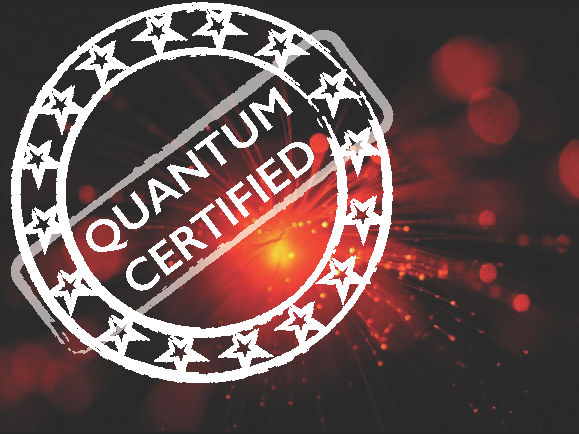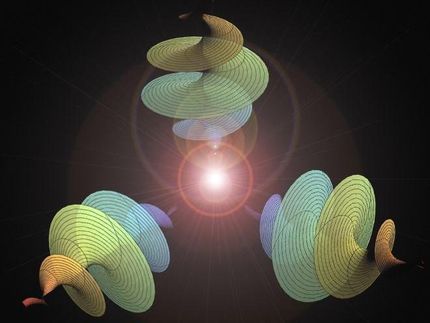Quality control of quantum simulators
In the past 20 years, the development of devices that exploit the laws of quantum physics has made impressive progress. New quantum technologies promise a variety of exciting applications, for example in the field of quantum information processing or for the safe encoding of data. Hence, the commercial use of quantum devices has now become feasible. There is, however, a severe obstacle to overcome: the lack of practical tools for certifying the functionality of the devices. This prevents the transformation of complex laboratory set-ups into commercial products. Now, an international team of scientists has proposed a new certification method that applies to photonic devices in which light quanta serve as the carriers of quantum information.
This new method, developed by Prof. Dr. Jens Eisert (Freie Universität Berlin), Prof. Dr. Leandro Aolita (Universidade Federal do Rio de Janeiro), Dr. Christian Gogolin, postdoctoral scientist in the Theory Division at MPQ (Garching) and Research Fellow at ICFO (Barcelona), as well as Martin Kliesch (Freie Universität Berlin), is characterized by its high reliability and simplicity. It is an important step towards exploiting the quantum mechanical behaviour of quantum many-body systems in a controlled way.
Quantum simulation as well as quantum cryptography has become increasingly important in the past years. The ultimate goal of all these efforts is a “general purpose computer”, a device with the power to solve all kinds of different problems, and outperforming any classical computer in terms of speed. How to achieve this goal remains a question of active research at present. There is, however, a kind of intermediate stage that is now within reach: so-called quantum simulators. By making use of quantum effects, these devices can at least solve certain specific tasks that cannot be treated efficiently with classical methods. They are fast, but not universal.
quantum optics represents a platform for the implementation of quantum simulators. Here the quantum mechanical properties of light quanta, such as entanglement and superposition, are being used. But how can one make sure that machines that rely on the use of microscopic particles work the way they are supposed to? “Certification is very difficult, in particular in case of non-universal quantum computers,” Dr. Christian Gogolin explains. “This is, because quantum simulators are limited in their capability to perform calculations. So you cannot run any kind of certification program. Instead, the program has to be tailored according to the specific properties of the quantum simulator.”
The problem of certification can be understood in terms of a game in which one very powerful player – let’s call him Merlin – challenges a much less powerful opponent, let’s call him Arthur. Merlin claims to be in possession of a quantum simulator, but Arthur is doubtful. He wants to have a proof that this is true, and that Merlin’s quantum simulator is indeed capable of solving problems that exceed his (Arthur’s) own abilities. The goal is to find a way for Arthur that allows him – despite of his limited resources – to check whether Merlin owns a functioning quantum simulator.
In their publication the scientists propose a test that offers this kind of certification for a variety of optical quantum simulators. For one, Arthur has to be able to detect and characterize single photons. Second, he has to use a classical computer in order to check Merlin’s solutions and make sure that his quantum simulator delivers the correct values. After a calculable number of “rounds” in this game Arthur will know with a certainty of say 99.9 % whether Merlin is able to prepare a selected quantum state to a selected precision.
The experimental techniques that are available today provide a surprisingly large number of potential applications of quantum effects. That makes it all the more important to prove that the methods live up to their claims. “Up to now, most of the effort went into the realization of quantum technologies whereas certification received hardly any attention”, Prof. Jens Eisert elaborates. “Now we have reached a point where this bottleneck hinders further experimental progress. The method we propose is rather simple, yet very reliable. Though it is tailored for optical devices, it also contributes to finding a general solution for the problem of certification.”

Graphic: image background: public domain / stamp: ICFO, Spain
Original publication
Other news from the department science

Get the chemical industry in your inbox
By submitting this form you agree that LUMITOS AG will send you the newsletter(s) selected above by email. Your data will not be passed on to third parties. Your data will be stored and processed in accordance with our data protection regulations. LUMITOS may contact you by email for the purpose of advertising or market and opinion surveys. You can revoke your consent at any time without giving reasons to LUMITOS AG, Ernst-Augustin-Str. 2, 12489 Berlin, Germany or by e-mail at revoke@lumitos.com with effect for the future. In addition, each email contains a link to unsubscribe from the corresponding newsletter.



























































